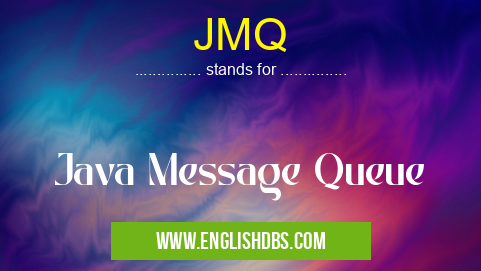What does JMQ mean in JAVA
JMQ (Java Message Queue) is an open-source, cross-platform message queuing system written in Java. It is designed to provide a reliable and efficient way to exchange messages between applications. JMQ is widely used in enterprise applications for tasks such as distributed processing, asynchronous communication, and data integration.

JMQ meaning in Java in Computing
JMQ mostly used in an acronym Java in Category Computing that means Java Message Queue
Shorthand: JMQ,
Full Form: Java Message Queue
For more information of "Java Message Queue", see the section below.
Features of JMQ
- Asynchronous Communication: JMQ enables applications to communicate with each other asynchronously, allowing them to process messages at their own pace without blocking each other.
- Reliable Messaging: JMQ ensures that messages are delivered to their intended recipients even in the event of network failures or application crashes.
- High Performance: JMQ is a highly performant message queuing system, capable of handling large volumes of messages with low latency.
- Scalability: JMQ can be scaled to handle increasing message loads by adding more servers to the cluster.
- Durability: JMQ supports persistent storage of messages, ensuring that messages are not lost even if the system fails.
Benefits of Using JMQ
- Improved Application Performance: JMQ enables applications to process messages asynchronously, reducing the need for synchronous communication and improving overall performance.
- Enhanced Reliability: JMQ provides reliable messaging, ensuring that messages are delivered even in the event of network failures or application crashes.
- Increased Scalability: JMQ can be scaled to handle increasing message loads, making it suitable for enterprise applications with high-volume messaging requirements.
- Simplified Development: JMQ provides a simple and intuitive API, making it easy for developers to integrate messaging into their applications.
Essential Questions and Answers on Java Message Queue in "COMPUTING»JAVA"
What is Java Message Queue (JMQ)?
JMQ is an open-source asynchronous messaging system developed by Oracle. It provides a reliable and scalable way to exchange messages between multiple applications, processes, or devices.
What are the benefits of using JMQ?
JMQ offers several benefits, including:
- Asynchronous communication: Decouples message producers and consumers, allowing applications to communicate without waiting for responses.
What are the different types of messaging patterns supported by JMQ?
JMQ supports various messaging patterns, such as:
- Point-to-point (P2P): Messages are sent from a single producer to a single consumer.
How is JMQ used in real-world applications?
JMQ is used in a wide range of applications, including:
- Enterprise service buses (ESBs): Integrates different applications and services through reliable message exchange.
Final Words: JMQ (Java Message Queue) is a powerful and widely used message queuing system that provides reliable, efficient, and scalable messaging capabilities. Its features and benefits make it an ideal choice for enterprise applications that require high-performance, reliable, and scalable communication.
